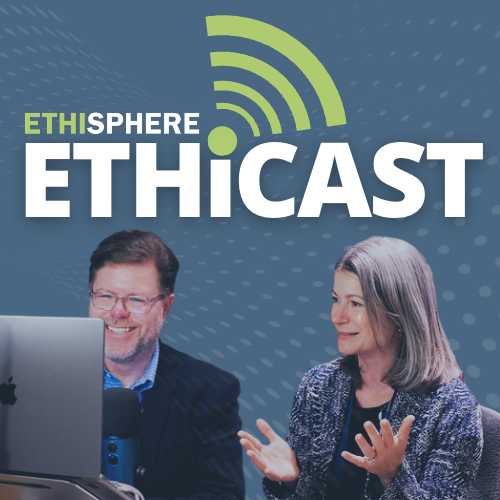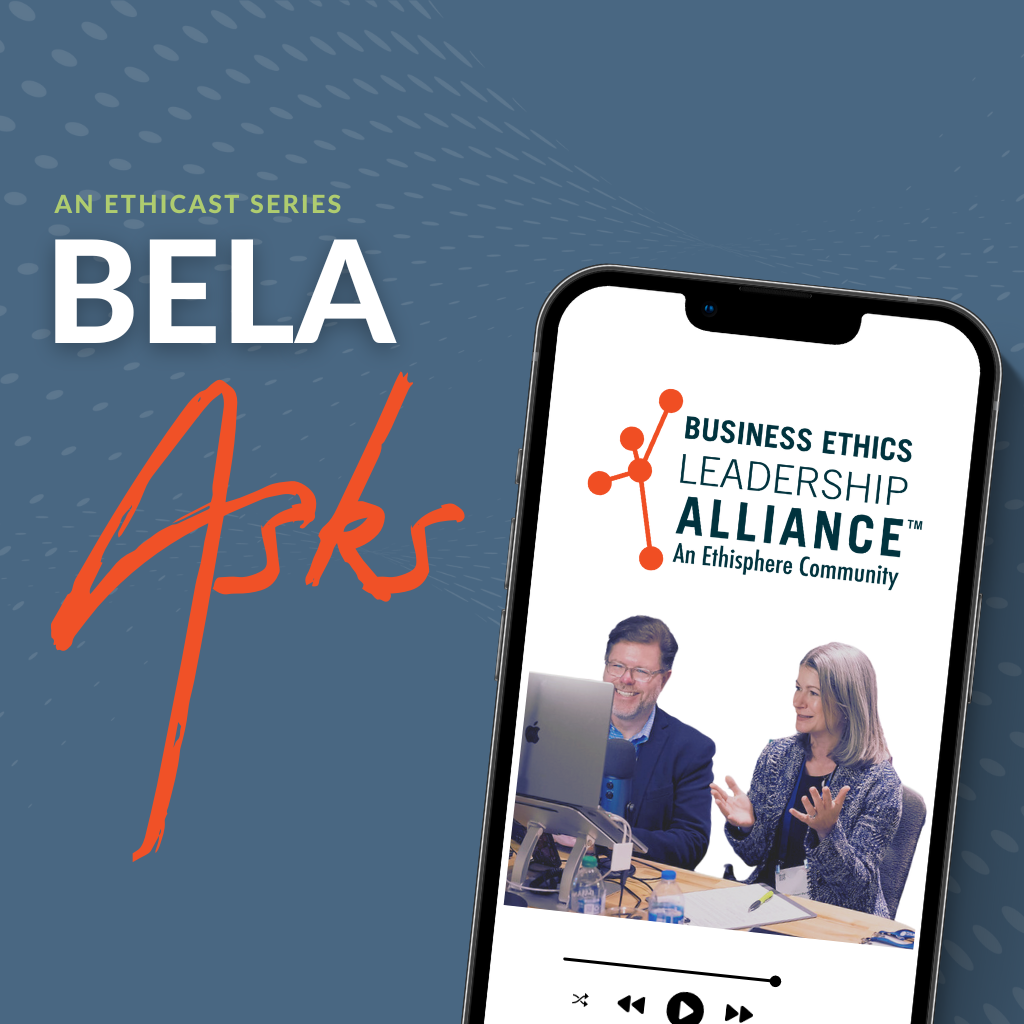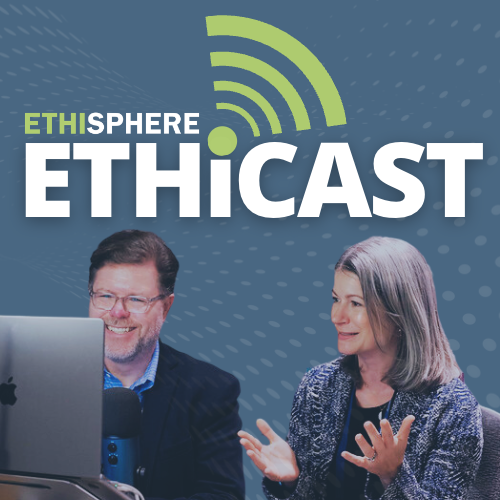[00:00:00] Speaker A: Hi everyone. Today we'll discuss how you can use trust, ethics and compassion as your secret superpowers for transforming your organization's culture. I'm your host, Bill Coffin, and this is the Ethicast.
Organizational culture is the accumulation of a million small things that collectively creates the shared lived experience of employees. Most organizations think they have a great culture, and most organizations don't actually have a culture that's as strong as they think it is. Grand statements and top down initiatives are fantastic, but if they're out of sync with the daily reality that employees face and reinforce, then that spells trouble. Through regular cultural assessments, organizations can measure their culture and spot where their strengths and opportunities for improvement lie. But knowing where your organization's culture needs help, knowing how to help it, are two very different things. Joining us today is Ethan Chasin, a culture transformation coach specializing in designing, developing, implementing and measuring employee training, executive performance, and culture transformation initiatives. He is the host of the business culture podcast Chasing the Dream and is the author of the book the Compassionate Organization. In that, Ethan explores how organizations build thriving cultures by leveraging trust, developing powerful vision and mission statements, and applying ethical best practices to build effective workplace cultures. Ethan, thank you so much for joining us.
[00:01:29] Speaker B: Bill, thanks for having me on your program. It is such an honor to be with you.
[00:01:33] Speaker A: Well, you have described yourself as, quote, pathologically devoted to culture, so I'd love to hear about what that means to you and what organizations should be looking for when they want to bring their own organizational culture to the next level.
[00:01:45] Speaker B: You and I both know there's three levers an organization can pull to remain competitive. One is strategy. If you have great strategy and horrible people, why bother? The second is operational efficiency. If you have great operational efficiency, that's not a competitive advantage. Because guess what? Everybody's heard of AI and ChatGPT and startups have access to EOS, integrators and implementers. The only lasting competitive advantage you have is your people. And that's what I've been on a mission is to help organizations unleash their people's untapped potential because of what was done to me over 20 years in the private sector.
[00:02:23] Speaker A: Ethan, I understand that you spent some 10 years on the research that went into your book the Compassionate Organization. Can you talk about that process, what you learned as you wrote that book? And most Importantly, once you're 10 years into a project, how do you know when to stop, other than being a.
[00:02:40] Speaker B: Masochist and glutton for punishment?
There was literally a driving thought that I had from the Moment I graduated from college, thought I was going to take the advertising world on fire, went into advertising to realize how dysfunctional it was, then go and foolishly get an MBA and then spend 20 years in corporate was. I've always had this thought in the back of my mind. Is there a way to identify in all of the most successful organizations all over the world, regardless of where they are in their life cycle, what industry sector, what leadership team structure, what products, what if any characteristics unite those organizations that are always the most successful?
I started by dipping my toe in the shallow end of those few at the time, great places to work. And then it just slowly snowballed downhill looking at more organizations, finding great organizations, expanding my reach outside of North America. And just months became years. And the the point at which I hit my north star, where after 10 years I said that's enough, was when I came to the realization that regardless of organizations characteristics, attributes, leadership, team founders, regardless of anything else, they actually only share one, one characteristic. And I don't care what organization. You look at all of the organizations that are either the first or second strongest financial performers in their respective market, they have one thing in common and you kind of said it because it's in the book title. It's an amazingly compassionate culture. That's what enables organizations to win.
[00:04:32] Speaker A: So I've talked to a lot of folks from organizations that have really strong cultures for the most part, but they have really flinty top leadership that may be out of sync with the larger body of the organizational culture. When you're talking about a word like compassionate, right, One can imagine hard driving super alpha types, they hear that and go, well that's just, you know, that's too soft, that's too fuzzy. We're here to, you know, move fast and break things and to change the world. Compassion has nothing to do with any of those things. Can you talk to me about why compassion is such an important part of culture and why compassionate organizations are more successful organizations?
[00:05:09] Speaker B: You don't have to believe what a Bill Coffin or Ethan Chasin says if you want to drive an organization forward and lead it to success, not the short, but the long term. We've got over 50 years of data, objective data gathered in the field of organizational development that proves that organizations that have create cultures that are driven by a pathological desire to treat their people with trust, loyalty, empathy. Those people, and everybody's heard this, they're happier, they're more engaged, they perform and produce at a higher level. And what's the end result of that financial Profitability. So I have been trying over the last few years to explain to those kinds of individuals who hear warm and fuzzy or marshmallow. When you hear compassionate culture, what you're really hearing is a way to disseminate power from the few at the top who by the way are the people who should be in the least control. Because if you think this way, they're at the top. That means they are the farthest removed from the market. Customers, vendors, partners, suppliers, access to talent. So what you want to do is democratize by as I've worked with my clients, rip out all that bureaucracy, rip it out, become a flatter matrix organization driven by self managed teams. And I literally, literally the way for me to justify this financially, I've developed a process in my consulting practice called an employee ROI. We look at every single individual, whether five individuals or 50,000, whether you're in a revenue generating sales role or a back office role. We literally quantify their contribution. And in that way we can start to have a language that maybe those hardcore folks are maybe more receptive to the notion of culture. Look, if you don't believe us, Bill and Ethan, fine, keep doing what you're doing. Your competitors are changing and your competitors will therefore have access to the best talent. By the way, when somebody tells me there's a war on talent, I know that they're a dying organization. When they refer to their people as an asset, that to me again, in poker parlance that's a tell. You're dying. Your organization is dying. If that's how you look at your people, as your largest expense. So these are the conversations I love because it allows me to say if you're, if you're predisposed to not want to change, the marketplace will change for you. You know, there's a reason why they say Gen Z's only worked at companies for three, four, six months. Because they're moving on to some other organization who will treat them well. The 21st century organization has no room for managers. Managing and leading are diametrically opposed. What does management mean? It's a 20th century vestige of control. Management leads to take to guide your people or assets. They need to be whacked from behind, not led from the front. So you're driving them. That's management. It's dead. We want leaders who inspire and motivate. Also change your hiring process. You'll teach whatever skills you need on the job to people who possess exceptional characteristics. Critical thinkers, intrinsically motivated problem solvers. Oh, but how do I find them? They're not there. Yes they are. And that's the same in all five generations of the workforce. The other thing I would say is we talked about managing versus leading. The second is the reason more organizations don't unleash their people's potential by giving over control. They don't trust them. That's it. And you know whose issue that is? That's ownership. That's the leadership team. Because that inherently proves you're going to fail. This is the 21st century. Culture is the only thing that's lasting. Everything else is just moving deck chairs on the Titanic.
[00:09:03] Speaker A: You do a lot of work on multi generational workforces which present their own particular cultural challenges. Especially as companies struggle to understand how to best engage with their Gen Z employees. So could you share some thoughts on the biggest challenges and opportunities that you see within the current 5 generational workforce?
[00:09:20] Speaker B: Here's the single greatest gift I can give any business owner. Stop trying to justify using generational stereotypes. What Gen Zs are in terms of negative and what they're not capable in terms of positive. There are five generations. In order to get each of them to work with each other on self managed teams, no management, they do it themselves. You need people to work collaboratively in order to do that means they have to have respect and trust for one another. Which means instead of saying Gen Z's are this or that and matures are this or that, we find common ground. Who are you bringing in? I guarantee your hiring process is inherently flawed because you want to look for people who know how to work together. Different backgrounds, different cultures, different upbringing sensitivity.
You do that with behavioral interviewing. So that's the first thing. Bridge the five or six generation dividend by thinking about what brings people together and changing your interviewing and your hiring strategies to look for people who have a demonstrated track record of success working with other generations regardless of age. You want people who have been raised in a culture, a society, a family where they have respect for others.
And that's, that's universally the same whether you're 18 or 16.
[00:10:42] Speaker A: During the COVID pandemic, I think we saw a lot of organizations have this really kind of serious moment where a lot of old leadership and management paradigms kind of hit this, this real serious truth machine on are they going to work anymore or are they not? And you saw a lot of really successful cultures. Successful organizations use that as a transformational moment and they kind of embrace new ways of thinking and have since become new organizations and are still new organizations. And I find it kind of curious when you see organizations, there have been some making the news recently, like, well, guess what, you know, fun times over. We're all going back to the office. Like, that's just, that's, that's actually. It strikes me as a. They're trying to turn back time and go back to an earlier day where, you know, standards are a little bit different.
[00:11:26] Speaker B: That's a really seminal moment in terms of the 21st century organizational dynamic. And so to your point, and I love the fact that you said that, Bill, the notion of, okay, everybody's got to go remote, which means everybody is virtual. Well, that's the first question is how do you build and maintain culture in that kind of environment? It's possible. And then also how do you build relationships? You started out our session today, our episode, by saying culture is the collective interactions of all people. You know, it's what you experience as an employee every day that you go in or log on. So the first was post Covid hybrid. Excuse me, virtual. Then it was some sensitivity, pretend sensitivity. Well, we'll go to a hybrid schedule. And now it's morphed back into pre Covid 20th century. You must come in edict from the top.
What the hell does that imply? It's not a one size fits all. It depends on the individual, it depends on the team, it depends on the pre existing culture to just say you must come in regardless of your unique situation. I guarantee you if you look at their employee health and wellness programs, how they treat psychological safety and employee engagement, and how do they care or not care about their employees individual needs? They don't. And that you, you led off our talk today with the notion of there's two different kind of Jekyll and Hyde cultures. The formal culture is in your marketing spin. It's what you say on those black lacquered fragments frame posters you hang everywhere that may have no basis in reality. The informal culture is what your people live and breathe. And honestly, the reason people say come into the office again, they don't trust their employees to be grown ups. Well, if you don't trust your employees, then I would say you need to rethink the kind of characteristics and attributes you look for in your hiring. Because if you don't trust your people, you don't think they're grown ups. That's on you.
[00:13:27] Speaker A: Well, Ethan, it has been delightful to have you on the show. Thank you so much for coming on and for sharing your insights with us.
[00:13:33] Speaker B: It's been my pleasure. I just want to give a shout out. I've been using Ethisphere for literally decades. In fact, you were the seminal research authoritative body I went to to write my second book. So thank you for having me on the program. Bill. It's been an honor.
[00:13:48] Speaker A: To learn more about what Ethan's working on Next, please visit thechazingroup.com Ethan's book the Compassionate Organization is available now at Amazon and on barnes and noble.com and be sure to subscribe to his podcast Chasing the Dream on YouTube or at thechasongroup.com for a host of free resources about how you can build value by advancing a strong culture of ethics, including the 2024 Ethical Culture Report. Please visit the Ethisphere resource
[email protected] resources this show is all about showcasing excellence in action and the best thought leaders in the ethics and compliance community. If you'd like to appear as a guest on the Ethicast to share a best practice, a success story, or your own proof point around how business integrity builds value, we would love to hear from you. Please drop us a line at the link in this show's show Notes. I'm Bill Coffin and this has been the ethocast for more episodes. Please visit the Ethisphere YouTube channel at YouTube.com ethisphere and if this is your first time enjoying the show, please make sure to like and subscribe on YouTube, Apple Podcasts and Spotify. Thank you so much for joining us. And until next time, remember, strong ethics is good business.


